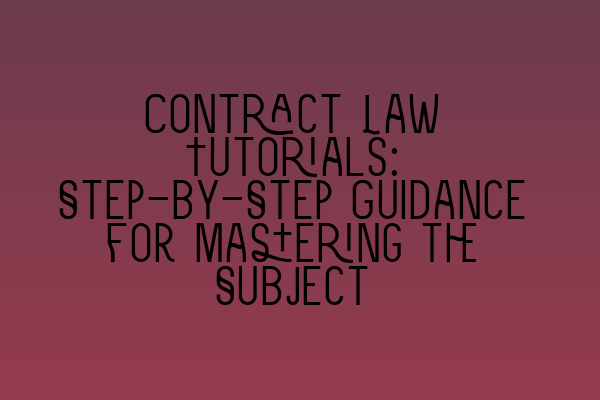Contract Law Tutorials: Step-by-Step Guidance for Mastering the Subject
Welcome to SQE Contract Law! As a solicitor, writer, and SEO expert, I understand the importance of providing comprehensive and accessible resources for aspiring legal professionals. In this blog post, we will delve into the world of contract law and provide you with step-by-step guidance to help you master the subject.
Before we begin, it’s worth mentioning that SQE Contract Law is an essential topic for both the SQE1 and SQE2 exams. Therefore, it’s crucial to have a solid understanding of contract law principles and concepts. Whether you are a law student, a trainee solicitor, or a legal professional looking to brush up on your contract law knowledge, this tutorial will prove invaluable.
Now, let’s get started!
1. Understanding the Basics
To begin our journey into contract law, let’s establish a solid foundation by understanding the basics. We’ll explore fundamental elements such as offer, acceptance, consideration, intention to create legal relations, and capacity. By grasping these core principles, you’ll be well-equipped to analyze and interpret contractual agreements.
2. Formation of Contracts
Contracts can be formed in various ways, and it’s crucial to understand the different methods. We will walk you through the process of contract formation, including the distinction between bilateral and unilateral contracts, the concept of invitation to treat, and the importance of certainty and agreement.
3. Terms of the Contract
Once a contract is formed, it’s necessary to examine the terms that govern the parties’ rights and obligations. We will guide you through the classification of terms, distinguishing between conditions, warranties, and innominate terms. Additionally, we will explore the implications of express and implied terms, as well as the importance of the Parol Evidence Rule.
4. Vitiating Factors
Not all contracts are valid and enforceable. There are certain factors that can affect the legality or enforceability of a contract. We will delve into vitiating factors such as misrepresentation, mistake, duress, undue influence, and illegality. Understanding these factors is crucial for identifying when a contract can be challenged or set aside.
5. Discharge of Contracts
Contracts can come to an end in various ways. We will explore the methods of contract discharge, including performance, frustration, agreement, breach, and operation of law. Understanding these concepts will allow you to navigate situations when the performance of a contract becomes impossible or impracticable.
6. Remedies for Breach of Contract
When a party fails to perform their obligations under a contract, there are several remedies available to the injured party. We will discuss the different types of remedies, including damages, specific performance, injunctions, and restitution. It’s important to understand the circumstances under which each remedy is appropriate and the factors that determine their availability.
7. International Aspects of Contract Law
In an increasingly globalized world, it’s essential to have a basic understanding of the international aspects of contract law. We will touch upon topics such as choice of law, jurisdiction, and the application of international conventions. This knowledge will prove invaluable when dealing with cross-border transactions and disputes.
By following these step-by-step tutorials, you will be well on your way to mastering contract law. Remember, practice makes perfect! To further enhance your understanding, we recommend taking advantage of SQE 1 Practice Exam Questions and SQE 1 Practice Mocks FLK1 FLK2, which will allow you to test your knowledge and familiarize yourself with the format of the SQE1 exam.
For those preparing for the SQE2 exam, SQE 2 Preparation Courses are available to provide comprehensive guidance specifically tailored to the requirements of that stage.
To stay informed about important dates and exam schedules, make sure to regularly check the SRA SQE Exam Dates page.
In conclusion, mastering contract law is essential for aspiring solicitors. By following our step-by-step tutorials, you can gain a solid foundation in contract law principles, formation, terms, vitiating factors, discharge, remedies, and international aspects. Take advantage of the related articles mentioned earlier to further enhance your knowledge and prepare for the SQE exams.
Thank you for joining us on this journey into contract law. Stay tuned for more informative content from SQE Contract Law, where we aim to provide you with the knowledge and resources needed to excel in your legal career.
